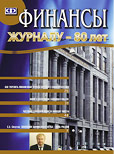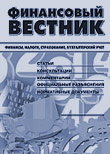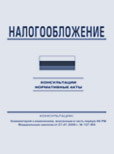Содержание
АКТУАЛЬНО
Н.А. Бегчин, директор Департамента программно-целевого планирования и эффективности бюджетных расходов Минфина России, кандидат экономических наук
E-mail: finance-journal@mail.ru
В 2021 г. Правительство Российской Федерации утвердило новый порядок работы с государственными программами Российской Федерации. В статье приводятся предпосылки перехода к новому порядку, основные новации в системе управления государственными программами, а также основные мероприятия для дальнейшего ее развития. Отмечено, что наличие зрелой системы программно-целевого планирования является важным условием повышения эффективности бюджетных расходов и качества государственного управления в целом.
Ключевые слова: государственные программы, система управления государственными программами, эффективность бюджетных расходов.
ФИНАНСЫ И БЮДЖЕТ: ПРОБЛЕМЫ И РЕШЕНИЯ
И.В. Балынин, доцент Департамента общественных финансов Финансового факультета Финансового университета при Правительстве Российской Федерации, кандидат экономических наук
E-mail: igorbalynin@mail.ru
В статье автором на основе проведенного анализа предлагаются мероприятия по совершенствованию управления расходами федерального бюджета на предоставление целевых межбюджетных трансфертов на финансирование объектов социальной инфраструктуры в Российской Федерации. Предложены архитектура и направления раздела на Едином портале бюджетной системы Российской Федерации по вопросам строительства объектов социальной инфраструктуры.
Ключевые слова: межбюджетные трансферты, расходы бюджета, федеральный бюджет, социальная инфраструктура, бюджетная политика, единый портал бюджетной системы.
РЕГИОНАЛЬНЫЕ ФИНАНСЫ
Н.Я. Кривоносова, доцент кафедры финансов и управления Читинского института (филиала) Байкальского государственного университета, кандидат экономических наук
E-mail: krivonos_nat_ja@mail.ru
В настоящей работе исследуется история возникновения, а также практика внедрения и функционирования средств самообложения граждан как инструмента повышения неналоговых доходов местных бюджетов в Российской Федерации и в Забайкальском крае в частности. Установлены общероссийские тенденции развития самообложения на протяжении 10-летнего периода наблюдений, в том числе и в период «коронакризиса». Определены основные проблемы, препятствующие повышению роли данного механизма в доходах местных бюджетов. В результате исследования обоснована необходимость изучения положительного опыта и негативных тенденций развития самообложения с целью укрепления финансовых основ муниципалитетов.
Ключевые слова: местное самоуправление, местный бюджет, доходы бюджета, неналоговые доходы, самообложение граждан, Забайкальский край.
КАЗНАЧЕЙСТВО: СТАНОВЛЕНИЕ И РАЗВИТИЕ
А.В. Ермоленко, начальник отдела предварительного контроля департамента казначейского исполнения бюджета Комитета финансов Ленинградской области
E-mail: ankin2002@mail.ru
М.И. Канкулова, профессор кафедры государственных и муниципальных финансов Санкт-Петербургского государственного экономического университета, доктор экономических наук
E-mail: kankulova@mail.ru
В статье обобщены результаты исследования средств и способов повышения операционной эффективности бюджетного процесса. Авторами выявлены и систематизированы риски нарушений в бизнес-процессах казначейского контроля финансового органа субъекта РФ. Разработан инструментарий управления идентифицированными рисками, который может быть актуален и востребован субъектами РФ, осуществляющими самостоятельное исполнение своих бюджетов с открытием лицевого счета бюджета в органе Федерального казначейства. Применение предложенной модели внутреннего операционного контроля в ходе санкционирования бюджетных расходов, снижая риски нарушений в бюджетном процессе, будет способствовать обеспечению финансовой устойчивости публично-правовых образований.
Ключевые слова: финансовый орган, бюджетный процесс, санкционирование операций, внутренние операционные риски, внутренний контроль, внутренний финансовый контроль, внутренний финансовый аудит.
НАЛОГИ: ТЕОРИЯ И ПРАКТИКА
Л.Ш. Юлгушева, старший преподаватель кафедры государственных и муниципальных финансов РЭУ имени Г.В. Плеханова, ведущий консультант департамента налоговых услуг ФБК Legal, кандидат экономических наук
E-mail:lilia.yulgusheva@gmail.com
В статье рассматривается роль международных договоров в усилении налогового контроля налогоплательщиков, осуществляющих трансграничную деятельность.
Ключевые слова: международное налогообложение, налоговый контроль, международные договоры в области налогообложения, обмен информацией, CRS.
СТРАХОВАНИЕ
М.В. Романова, профессор кафедры экономики и финансов Московского международного университета, советник государственной гражданской службы Российской Федерации 2 класса, доктор экономических наук, доцент
E-mail: sever1113@yandex.ru
Данная статья посвящена анализу развития системы страхования вкладов в России с 2007 г. по состоянию на 1 октября 2022 г. с целью оптимизации работы кредитных организаций, а также для сохранения в полном объеме страхового возмещения, получаемого вкладчиками банков после ликвидации банков.
Ключевые слова: система страховых вкладов, банк, страховое возмещение, счет эскроу.
ФИНАНСЫ СОЦИАЛЬНОЙ СФЕРЫ
Д.А. Артеменко, заведующий кафедрой «Государственные, муниципальные финансы и финансовый инжиниринг» Высшей школы бизнеса Южного федерального университета, доктор экономических наук
E-mail: dartemen@mail.ru
Ф.Н. Кадыров, советник директора Центрального научно-исследовательского института организации и информатизации здравоохранения Минздрава России, профессор ФГБОУ ВО СЗГМУ им. И.И. Мечникова, заслуженный экономист РФ, доктор экономических наук
E-mail: kadyrov@mednet.ru
А.М. Чилилов, научный сотрудник Национального медицинского исследовательского центра хирургии имени А.В. Вишневского Минздрава России, кандидат экономических наук
E-mail: chililov@mail.ru
Система обязательного медицинского страхования характеризуется большим разнообразием финансовых потоков. И если дополнительные источники средств, поступающих в систему обязательного медицинского страхования, в целом логичны, то направления использования этих средств в ряде случаев вызывают вопросы с точки зрения их обоснованности.
Как показано в исследовании, многие межбюджетные трансферты, например связанные с так называемыми родовыми сертификатами, направлены на решение конкретных узких задач и не соответствуют логике обязательного медицинского страхования.
Еще более сложным являются механизмы, связанные с финансовым обеспечением высокотехнологичной медицинской помощи, не входящих в базовую программу обязательного медицинского страхования.
Ключевые слова: обязательное медицинское страхование, страховые взносы, межбюджетные трансферты, субвенции, субсидии, федеральный фонд обязательного медицинского страхования.
МНЕНИЯ
О.В. Хмыз, доцент кафедры международных финансов МГИМО МИД России, кандидат экономических наук, доцент
E-mail: khmyz@mail.ru
В статье сделана попытка проанализировать, каким образом глобальная турбулентность отразилась на глобальном зеленом курсе (что поставлено целью данной статьи), а также выявить реальные и потенциальные факторы, сдерживающие (либо стимулирующие) зеленое финансирование в разных странах мира в новых условиях и определить его перспективы.
Разрабатываемое регулирование для достижения общемировых климатических целей способствует привлечению финансирования и направлению потоков капитала в зеленые активы и проекты, тем самым поддерживая будущее новых поколений.
Ключевые слова: зеленые финансы, Таксономия ЕС, зеленое финансирование, устойчивое развитие.
Content
TOPICAL
N.A. Begchin, director of the Department of program-targeted planning and efficiency of budget expenditures of the Ministry of finance of Russia, candidate of economic sciences
E-mail: finance-journal@mail.ru
In 2021, the Government of the Russian Federation approved a new procedure for working with state programs of the Russian Federation. The article provides the prerequisites for the transition to a new order, the main innovations in the government program management system, as well as the main measures for its further development. It is noted that the presence of a mature program-targeted planning system is an important condition for improving the efficiency of budget expenditures and the quality of public administration in general.
Keywords: state programs, system of state programs management, efficiency of budget expenditures.
FINANCE AND BUDGET: PROBLEMS AND SOLUTIONS
I.V. Balynin, associate professor of the Department of public finance, Faculty of finance, Financial university under the Government of the Russian Federation, candidate of economic sciences
E-mail: igorbalynin@mail.ru
Based on the analysis, the author proposes measures to improve the management of federal budget expenditures for the provision of targeted interbudgetary transfers to finance social infrastructure facilities in the Russian Federation. The architecture and directions of the section on the Unified Portal of the Budget System of the Russian Federation on the construction of social infrastructure facilities are proposed.
Keywords: interbudgetary transfers, budget expenditures, federal budget, social infrastructure, budget policy, unified portal of budget system.
REGIONAL FINANCE
N.Ya. Krivonosova, associate professor, Department of finance and management, Chita institute (branch), Baikal state university, candidate of economic sciences
E-mail: krivonos_nat_ja@mail.ru
This paper examines the history of emergence, as well as the practice of introducing and functioning self-taxation tools for citizens as a tool to increase non-tax revenues of local budgets in the Russian Federation and in the Trans-Baikal Territory in particular. All-Russian trends in the development of self-taxation have been established over a 10-year observation period, including during the "coronacrisis." The main problems that prevent an increase in the role of this mechanism in the income of local budgets have been identified. As a result of the study, the need to study positive experiences and negative trends in the development of self-taxation in order to strengthen the financial foundations of municipalities is justified.
Keywords: local government, local budget, budget revenues, non-tax revenues, self-taxation of citizens, Trans-Baikal Territory.
TREASURY: FORMATION AND DEVELOPMENT
A.V. Ermolenko, head of the Preliminary control department of the treasury budget execution Department of the finance committee of the Leningrad region
E-mail: ankin2002@mail.ru
M.I. Kankulova, professor, Department of state and municipal finance, St. Petersburg state university of economics, doctor of economics
E-mail: kankulova@mail.ru
The article summarizes the results of the study of funds and ways to increase the operational efficiency of the budget process. The authors identified and systematized the risks of violations in the business processes of the treasury control of the financial authority of the constituent entity of the Russian Federation. A tool for managing identified risks has been developed, which can be relevant and in demand by the constituent entities of the Russian Federation that independently execute their budgets with the opening of a personal budget account in the Federal Treasury body. The application of the proposed model of internal operational control during the authorization of budget expenditures, reducing the risks of violations in the budget process, will contribute to ensuring the financial stability of public legal entities.
Keywords: financial body, budget process, authorization of operations, internal operational risks, internal control, internal financial control, internal financial audit.
TAXES: THEORY AND PRACTICE
L.Sh. Yulgusheva, senior lecturer, Department of state and municipal finance, Plekhanov PRUE, leading consultant, Department of tax services, FBK Legal, candidate of economic sciences
E-mail:lilia.yulgusheva@gmail.com
The article discusses the role of international treaties in strengthening the tax control of taxpayers engaged in cross-border activities.
Keywords: international taxation; tax control; international tax treaties; exchange of Information; CRS.
INSURANCE
M.V. Romanova, professor, Department of economics and finance, Moscow international university, advisor to the state civil service of the Russian Federation, 2nd class, doctor of economics, associate professor
E-mail: sever1113@yandex.ru
This article is devoted to the analysis of the development of the deposit insurance system in Russia from 2007 to October 1, 2022 in order to optimize the work of credit institutions, as well as to maintain in full the insurance compensation received by bank depositors after the liquidation of banks.
Keywords: insurance deposit system, bank, insurance indemnity, escrow account.
SOCIAL FINANCE
D.A. Artemenko, head of the Department of state, municipal finance and financial engineering, Higher school of business, Southern federal university, doctor of edconomics
E-mail: dartemen@mail.ru
S.V. Golovin, F.N. Kadyrov, advisor to the director of the Central research institute for the organization and informatization of health care of the Ministry of health of Russia, professor of the FSBEI HE SZMU named after I.I. Mechnikov, honored economist of the Russian Federation, doctor of Economics
E-mail: kadyrov@mednet.ru
A.M. Chililov, researcher at the A.V. Vishnevsky national medical research center for surgery of the Ministry of health of Russia, candidate of economic sciences
E-mail: chililov@mail.ru
The compulsory health insurance system is characterized by a wide variety of financial flows. And if additional sources of funds entering the compulsory health insurance system are generally logical, the directions of use of these funds in some cases raise questions from the point of view of their validity.
As shown in the study, many interbudgetary transfers, such as those associated with so-called birth certificates, are aimed at solving specific narrow problems and do not correspond to the logic of compulsory health insurance.
Even more complex are the mechanisms associated with the financial provision of high-tech medical care that are not part of the basic compulsory health insurance program.
Keywords: compulsory health insurance, insurance premiums, interbudgetary transfers, subventions, subsidies, federal compulsory health insurance fund.
OPINIONS
O.V. Khmyz, associate professor, Department of international finance, MGIMO Ministry of foreign affairs of Russia, candidate of economic sciences, associate professor
E-mail: khmyz@mail.ru
The paper attempts to analyze how global turbulence has affected the global Green Deal (which is the objective of this paper), as well as to identify real and potential factors that constrain (or stimulate) Green financing in different countries of the world in the new conditions and determine its prospects. The regulation being developed to achieve global climate goals contributes to attracting funding and channeling capital flows into green assets and projects, thereby supporting the future of new generations.
Keywords: green finance, EU taxonomy, green finance, sustainable development.











